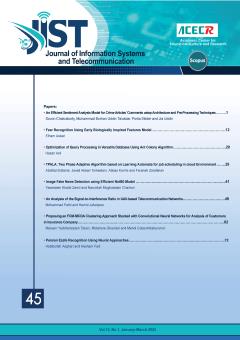Natural disasters are an inevitable part of the world that we inhabit. Human casualties and financial losses are concomitants of these natural disasters. However, by an efficient crisis management program, we can minimize their physical and social damages. The real chal
More
Natural disasters are an inevitable part of the world that we inhabit. Human casualties and financial losses are concomitants of these natural disasters. However, by an efficient crisis management program, we can minimize their physical and social damages. The real challenge in crisis management is the inability to timely receive the information from the stricken areas. Technology has come to the aid of crisis management programs to help find an answer to the problem. One of these technologies is wireless sensor network. With recent advances in this field, sensor nodes can independently respond to the queries from the users. This has transformed the processing of the queries into one of the most useful chapters in sensor networks. Without requiring any infrastructure, the sensor network can easily be deployed in the stricken area. And with the help of spatial query processing, it can easily provide managers with the latest information. The main problem, however, is the irregular shape of the area. Since these areas require many points to present them, the transmission of the coordinates by sensor nodes necessitates an increase in the number of data packet transmissions in the sensor network. The high number of packets considerably increases energy consumption. In related previous works, to solve this problem, line simplification algorithm s, such as Ramer-Douglas-Peucker (RDP), were used. These algorithms could lessen energy consumption by reducing the number of points in the shape of the area. In this article, we present a new algorithm to simplify packet shapes which can reduce more points with more accuracy. This results in decreasing the number of transmitted packets in the network, the concomitant reduction of energy consumption, and, finally, increasing network lifetime. Our proposed method was implemented in different scenarios and could on average reduce network’s energy consumption by 72.3%, while it caused only 4.5% carelessness which, when compared to previous methods, showed a far better performance.
Manuscript profile


